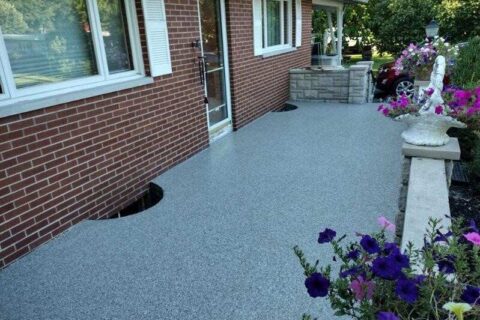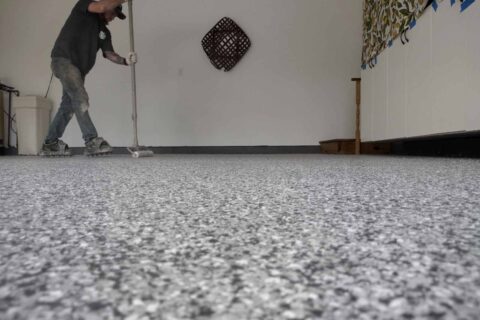Stronger than Epoxy
Epoxy and Polyurea are two distinct types of concrete floor coatings, each with its own set of characteristics and advantages. Understanding the differences between them can help in making the right choice for your specific concrete flooring needs.
- Chemistry and Curing Time:
- Polyurea is a type of polymer coating that results from a chemical reaction between an isocyanate component and an amine or amine-terminated resin. It cures very quickly, often within hours, making it ideal for projects that require fast turnaround times.
- Epoxy coatings are based on a reaction between epoxy resins and a hardening agent, typically a polyamine. The curing time is relatively longer than polyurea, usually taking a day or more to fully cure.
- Durability and Flexibility:
- Polyurea coatings are highly flexible and have exceptional impact resistance. They can withstand heavy loads, impacts, and movement without cracking or chipping.
- Epoxy coatings are durable but not as flexible as polyurea. They may chip or crack under extreme stress or movement.
- Chemical Resistance:
- Polyurea coatings exhibit superior chemical resistance, making them highly resistant to various chemicals, oils, and solvents.
- Epoxy coatings also offer good chemical resistance, but they may not perform as well as polyurea in harsh chemical environments.
- Temperature and Moisture Tolerance:
- Polyurea coatings can be applied in a wide range of temperatures and humidity levels, including damp or cold conditions.
- Epoxy coatings are sensitive to temperature and humidity during application, and some formulations may not adhere well in moist or cold environments.
- UV Stability:
- Polyurea coatings have excellent UV stability and do not yellow or degrade when exposed to sunlight, making them suitable for outdoor applications.
- Epoxy coatings can experience yellowing and degradation when exposed to UV radiation, so they are generally recommended for indoor use or areas with limited UV exposure.
- Installation and Recoating:
- Polyurea: Polyurea coatings can be applied in a single coat, reducing the application time. They also have a quick cure time, allowing for faster recoating or returning to service.
- Epoxy coatings may require multiple coats for optimal performance and often have longer curing times between coats.
In summary, while both offer durable and protective finishes for concrete floors, polyurea stands out for its fast curing, flexibility, chemical resistance, and suitability for various environmental conditions. Choosing between the two depends on the specific requirements of your project, and consulting with flooring professionals can help you make the best decision.
At Fortress Floors Midwest Pro we use a 100% Polyurea Basecoat along with our Polyaspartic Top Coat. Together they make our concrete floor coatings 4x’s stronger than Epoxy. Call us today for your Free Estimate.

